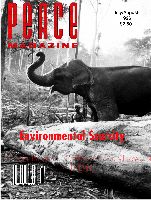
Peace Magazine Jul-Aug 1996, page 6. Some rights reserved.
Search for other articles by Rosalie Bertell here
Between May 30 and June 2, the Bilderberg Group, the shadow world government made up of the ruling elite of North America and Europe, met in secret at the CIBC Leadership Centre in King City, on the outskirts of Toronto. They were hosted by Conrad Black, a member of the Executive Committee, newspaper mogul, and a director of the Canadian Imperial Bank of Commerce; and Donald MacDonald, chair of the Ontario Hydro Commission (Toronto) and a member of the Bilderbergers' steering committee. Black is co-chair for Canada with Marie-Josée Drouin, Executive Director of the Netherlands Institute. The Bilderbergers take their name from the Hotel de Bilderberg in the Netherlands where they first met in 1954. They meet yearly as a group of about 115 persons to discuss world trends and business.
The Bilderbergers met in Bürgenstock, Switzerland in 1995; participants in that meeting included University of Toronto President Robert Prichard, NATO secretary Lord Carrington, Finland's President Ahtisaari, David Rockefeller, and Emma Rothschild. President Bill Clinton was inducted into the Bilderbergers at their 1989 meeting in Baden-Baden, Germany. Presidents Carter, Reagan, and Bush were also Bilderbergers prior to their elections.
After World War II the business community needed stability for its economic survival. European national rivalries were seen as the main destabilizing force, and in response to this threat Dr. Joseph Retinger, former top aide to General Sikorski, who was head of the Polish Government in exile in London, helped to form the European Movement. This was designed to restore world power to Europe.
This organization proved unworkable because Europeans could not agree to rearm Germany, and the Cold War polarization between the U.S. and USSR dominated world politics. The U.S. involvement in Southeast Asia, the Korean War, and McCarthyism in the United States were events of concern to European businesses, which feared fledgling U.S. diplomacy. In the late 1940s Retinger resigned and the European Movement collapsed. He then set up a committee of leading Europeans to critique U.S. foreign policy. This was presented to William Averell Harriman, administrator of the U.S. Marshall Plan in Europe, who counseled Retinger to wait until after the U.S. 1950 presidential election before formally presenting the critique to the U.S. government.
After General Eisenhower's election, Retinger presented his document to the U.S. Committee for a National Trade Policy, which drafted a reply. After a series of written responses, informal preparations, and small meetings, these European and North American elites met face to face in May 1954 at the Hotel de Bilderberg, Oosterbeek, Holland. Invitations were required and were, according to Retinger, sent to:
"only important and generally respected people who through their special knowledge or experience, their personal contacts and their influence in national and international circles can help to further the aims of Bilderberg - defending Western ethical and cultural [life]."
The Bilderbergers were concerned with European centrality in world affairs, with communism and the Soviet Union, with economic policies and problems related to "dependent peoples," and with European integration and defence. They apparently had a great distaste for McCarthyism in the U.S., since it was too close to Nazism, and this is what spurred their confrontation with the U.S. in policy issues. It is said that C.D. Jackson, President Eisenhower's assistant for "psychological warfare," assured the European Bilderbergers:
"Whether McCarthy dies by an assassin's bullet or is eliminated in the normal American way of getting rid of boils on the body politic, I prophesy that by the time we hold our next meeting he will be gone from the American scene."1
Prince Bernhard of the Netherlands was in charge of convening the meetings of the Bilderbergers and centralizing its activities until his resignation in 1976. Retinger was its permanent secretary until his death in 1960. One of their first achievements was the establishment of the International Atomic Energy Agency in August 1955 in response to President Eisenhower's Peaceful Atom Program initiated in 1954. The U.S. government and its armament industry had decided to go nuclear in a major way after the "successful" explosion of a hydrogen bomb in Bikini, March 1954.
The Bilderbergers have a fluid and changing membership, no elections, and exert significant informal influence on world affairs. According to the Report of the 1974 meeting in Megive, France, they "managed in effect to set the world's monetary system working again" after the 1973 OPEC oil crisis. The International Monetary Fund (IMF) and the World Bank, the Organization for Economic Cooperation and Development (OECD), the North American Treaty Organization (NATO) and the European Economic Community (EEC) are said to be the brain children of the Bilderbergers. It is said that today Emma Rothschild of the London Rothschilds appoints members to the Bilderbergers' Executive Committee, which sets the agenda and invites world leaders.
When Japanese wanted entrance to the Bilderberg-ers and when Americans wanted a more visible organization, the Bilderbergers spawned the Trilateral Commission. This out-front organization includes the Japanese, has press conferences, and publishes position papers. Heads of State routinely resign from the Trilateral Commission to prevent accusations of conflict of interest, but retain their position among the secretive Bilderbergers (the real seat of power). The Bilderbergers are non-elected, secretive players, accountable to no one.2
Rosalie Bertell is a Toronto-based Grey Nun , a scientist, and an activist with a special concern for the health effects of low level radiation.
1 Alden Hatch, HRH Prince Bernhard of the Netherlands (London: Harrap, 1962) p. 218.
2 For more information on these shadowy world power players, read Trilateralism by Holly Sklar, (Montreal: Black Rose Books). You will also find extensive references to the Bilderbergers in No Immediate Danger: Prognosis for a Radioactive Earth by Rosalie Bertell (Toronto: The Women's Educational Press).

Peace Magazine Jul-Aug 1996, page 6. Some rights reserved.
Search for other articles by Rosalie Bertell here